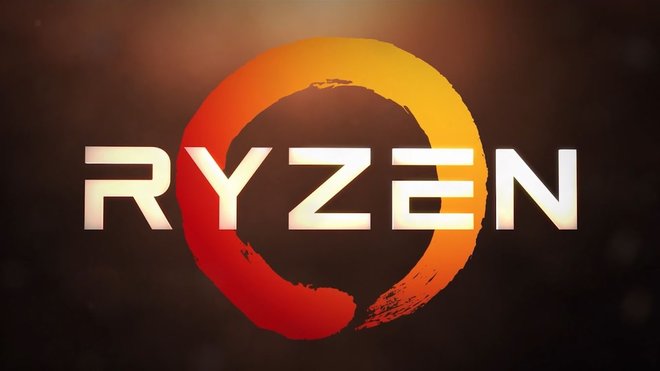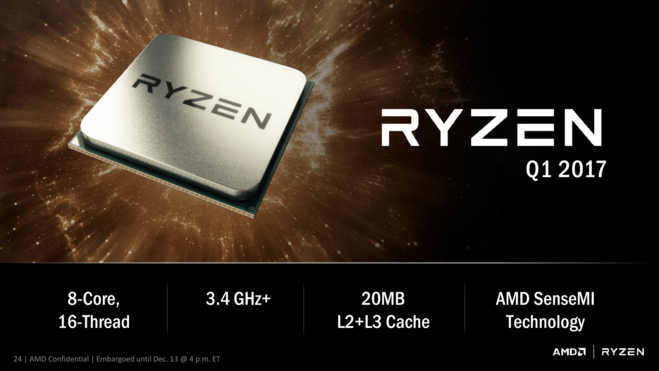You won't believe what the creators of AMD processors had to listen to over the years. Too slow, too hot, too old-fashioned. AMD users jokingly reported that they no longer needed to turn on the heat during Winter while their PCs were running and sarcastically raved about their unexpected floor heating. Low-budget PCs come with AMD CPUs by default, they were the second best choice, ideal for smaller pockets. Comparisons to the energy efficiency of old coal power stations were drawn, their naming scheme (AMD Bulldozer? They should have gone with Bobby Car) was ridiculed. But suddenly, the tides have turned - and the reason for that is called Ryzen.

Media representatives seemed surprised at first. They received emails asking them to get in touch with Intel before they would report on the new AMD flagship processor. Whatever happened behind the scenes, it was clear - someone was getting nervous. And understandably so, the last years have been easy going for Intel. Year after year, processor performance was moderately increased while AMD seemed a distant second, being the market leader was great. Prices were steep but since there was no real competition, they could afford it. Lately, test results have been piling up that indicate AMD is no longer playing catch up but taking the lead - and in style.
Ryzen (a play with words involving horizon and zen) is scheduled to become a big hit, if you can believe the hype. AMD's benchmarks show their product running circles around the competition, naturally, we'd better take the data with a pinch of salt. Companies generally only publish tests that conclude favorably on their products. When a Chinese team recently tested the AMD Ryzen 7 1700x against an Intel Core i7 6800k, it got really exciting. Both processors cost about the same (about $430), AMD's processor features 8 cores and Intel's model comes with 6. I don't want to bore you with the details, let's just say that Ryzen beat the competition in 30 out of 37 tests, and when it didn't, the performance difference was marginal. I'm not a friend of hysteria so: AMD hasn't "wiped the floor" with Intel (as was stated somewhere else) but simply launched a highly competitive product, finally. Even power consumption, a long-time Achilles' heel, is now acceptable and now a little below that of the competition.

The press is euphoric, even though they haven't got their hands on samples yet, as they've been hoping for a fierce product battle for a long time. We customers might also profit since Intel won't take this lying down. Whether they will cut prices for some of their processors, as rumors say, or respond with new models remains to be seen. Insiders are already reporting a full retaliation in the shape of a massive 12-core Skylake-X-CPU by Intel - but nothing has been confirmed so far. For now, preorder numbers for Ryzen are skyrocketing and the processor is already sold out at various stores. I recommend you wait and see. We haven't seen any independent tests yet, more budget-priced 4 and 6-core processors are still in development (and estimated to be in a $200 - $300 price range) and many users are likely already satisfied with the performance of their current PCs.
There's also mild confusion concerning the compatibility of Ryzen with older Windows versions. Originally reported to be fully compatible with Windows 10, Windows 7 and Windows 8.1 by AMD, the company has now gone back on this statement. There will be no "official support" for older versions of Windows by AMD, meaning their newest processor may either not work at all or deliver less performance. Whether this is, once again, Microsoft's fault, since they refuse to update the affected Windows versions, is a matter of opinion. I for one will lean back in anticipation of interesting reviews and rejoice at the fact that, finally, there is going to be new and exciting processor wars.




I'm asking a question that's actually way above my pay-grade here, but is it true to say that additional cores will only be of benefit to software that is written to make full use of all those cores?
So, is eight cores better than six, would twelve cores be better than eight, if the software engineers have not yet caught up with the proliferation of cores?
If I'm revealing my ignorance of such things with a stupid question, Sven, please put me right!
That’s not a dumb question at all and quite easy to answer. :) It’s true that many programs fail to utilize the many cores to their full potential. That means for example that two cores may run at maximum speed while four or six cores are idle. Operating systems like Windows 10 and most modern applications are quite apt at distributing the workload evenly across multiple cores to max out the system.
The Rabbit and the Tortoise..
I wonder how many people will be reading this on their tablets and mobile phones ... the world has moved on. I suppose that silicon is old hat now and really we are looking for some new technology which will lift computing out of the doldrums and go off on and carry us away on another fascinating glory trail...
But that kind of investment costs money... why risk it when the market is now ....controlled? I find it more noteworthy that the long time .. now arthritic manufacturers of Memory chips HDD's and now increasingly SSD's. Suddenly these dynasaurs seem to have become intent on taking over..... stabilising the situation by pushing out the new movers and shakers in the computer memory/storage industry and supplant them with themselves..
I suppose that this was inevitable ...the reason being that they intend to to cement their preciously guarded status quo. Their motivation has allways seemed to be inspired by the express intention of slowing all technological progress down to a chicken feed crawl to keep their cossetted shareholders happy.
My suspicion is that they do this so they can keep selling their expensively assembled product lines unchanged ad infinitum- without fear of any new technology appearing to render them outdated or ...underpriced?
Why change a certainity...one that keeps the money rolling in... maybe i am wrong - who knows for certain but this procedure has often happened before and ended in a fiasco. For example ... "Kodak!"
Sure, a life without cellphones and tablets is now hard to imagine. Then again, anyone who tries to create content more sophisticated than mere Twitter posts will soon realize that these devices have limits. If I had to type my blogs on a touch screen – I’d probably be in a mental hospital by now. There will always be a state of coexistence among various technologies, I believe.
GOOD to see competition
Technology is blasting far too quickly into the future to be of use to anyone/thing except robots who build robots who build robots who build robots causing the disintegration of the human race.
Been a fan of AM since the Dx4-100. Who wanted the Dx2-66, not me. Currently running a FX4100 and very happy. Intel prices are too rich for my pocket. I hope the Ryzen gives the competition a good run for its money.
Yeah, yeah! And what will it mean to the average computer user. Not a lot until Microsoft bloat up Windows 10 so the new processor is needed. Will it allow Burning Studio to write to a DVD any faster - I doubt it. I don't believe any of the current range of Ashampoo titles will benefit from the faster processor. One thing is for sure it won't make a difference to my awful typing speeds.
Burning itself won’t go any faster but the conversion process, e.g. prior to the creation of a video disc, will. :)
Ryzen beat the competition in 37 out of 30 tests; maybe a little misprint?
Thanks, you’re correct! The misprint has been fixed.